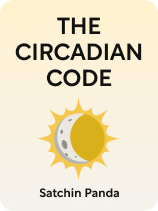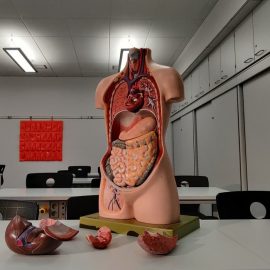

This article is an excerpt from the Shortform book guide to "The Circadian Code" by Satchin Panda. Shortform has the world's best summaries and analyses of books you should be reading.
Like this article? Sign up for a free trial here.
How healthful are your eating habits? What if you could sync your diet with your body’s natural rhythms?
Dr. Satchin Panda’s diet recommendations focus on aligning your eating patterns with your circadian rhythm. He suggests three key habits: maintaining a consistent meal schedule, avoiding late-night snacks, and consuming food within a specific daily window.
Read on to discover how these simple changes can improve your digestion, boost your energy, and enhance your overall health.
Dr Satchin Panda’s Diet Recommendations
According to Dr. Satchin Panda, diet impacts your circadian rhythm. To sync your eating with your circadian rhythm, he advises that you eat only when your body is prepared to digest foods. He explains that your digestive system isn’t designed to work all the time—it needs time to rest to function optimally. Eating when your body isn’t ready can lead to improper digestion and can overwork or damage your digestive system.
| Why We Always Want to Eat If your body’s only prepared to digest food at certain times of the day, why do you want to eat all the time? Michael Easter explains that humans evolved to eat whenever food was available because food wasn’t always easy to find. This instinct helped our ancestors survive, but it’s not as helpful in today’s world where food is much more accessible. On top of that, Easter says that stress can also make you want to eat when you’re not hungry. This is because eating foods (especially junk food) releases dopamine, which gives you a quick mood boost. We not only eat more frequently, but we often eat more than we should. In Ultra-Processed People, Chris van Tulleken explains that many of our diets contain ultra-processed foods (UPF)—things like packaged snacks, frozen meals, and fast food—that are designed to trick your brain into wanting to eat more food, even when you’re full. Several characteristics of UPFs cause you to overeat: For example, their calorie density means you take in more calories in a shorter time compared to whole foods. |
Panda suggests three eating habits that help maintain healthy digestive cycles: 1) Keep a regular eating schedule, 2) avoid late-night snacking, and 3) eat within a specific window each day.
Habit #1: Keep a Regular Eating Schedule
First, Panda recommends you stick to a regular meal schedule. When you eat around the same times every day, your body can process foods most efficiently and effectively. Your body learns when to expect food intake and prepares in advance to digest it—for instance, your stomach might produce more acid.
Panda adds that having breakfast at a consistent hour is especially important because it calibrates your circadian rhythm with the outside world. The first thing you eat or drink each day—apart from water—signals to your body that the day has begun and that it’s time to start daytime functions, such as releasing hormones for alertness and ramping up your metabolism.
| Use Intuitive Eating to Find Your Ideal Regular Eating Schedule Panda recommends you have meals at the same times every day, but he doesn’t elaborate on how to figure out the best times to eat those meals. In Intuitive Eating, Evelyn Tribole and Elyse Resch provide an approach called intuitive eating that can help. Intuitive eating means letting your body’s natural hunger and fullness cues guide when you have your meals and how much you eat. Tribole and Resch explain that intuitive eating helps you rebuild trust in your body’s signals. You honor your hunger by eating when you first notice stomach grumbles or low energy. You also respect your fullness by stopping when you feel comfortably satisfied, knowing you can eat again when you’re hungry. As you practice intuitive eating, you might find that you’ll naturally start eating in accordance with Panda’s recommendations about meal timing. For example, you might discover that the times you naturally feel hungry are consistent from day to day. Then, you can regularly eat your meals at these times, as Panda suggests. |
Habit #2: Stop Late-Night Eating
A second habit Panda suggests you adopt is to avoid eating anything two to four hours before bedtime. Your body shifts its focus from digestion to rest and repair after your last meal of the day so it can work on important tasks during sleep—like repairing damaged cells and growing healthy gut bacteria. So, if you eat after this shift happens, you interrupt your digestive system’s healing time and force it to process food when it isn’t prepared to do so.
Panda writes that eating when your digestive system isn’t prepared to process food can lead to indigestion and weight gain. Let’s explore why.
Indigestion
First, eating late causes indigestion because the gut muscles that push food through your intestines are less active at night, meaning food moves slower through your digestive tract. Additionally, when you’re standing or sitting during the day, gravity helps pull food downward through your digestive system. However, when you’re lying down to sleep, this gravitational effect is reduced, slowing digestion. Panda adds that at night, your body makes more stomach acid and less saliva to balance it out, which can make acid reflux worse if you eat late.
Weight Gain
Second, Panda writes that late-night eating causes weight gain because it disrupts your body’s natural fat-burning process. He explains that your body typically starts to burn fat only a few hours after you’ve last eaten. When you eat late at night, you reset this timer, preventing your body from entering this fat-burning mode. If you regularly eat late, you repeatedly interrupt this process, which can lead to weight gain and related health issues like insulin resistance.
Habit #3: Eat Within a Specific Window
Panda recommends a third habit for healthy circadian eating: Consume all your food within a 12-hour or shorter window each day—a technique known as time-restricted eating (TRE). Eating within a set window allows your digestive system to take a break. This rest period gives your body time to repair damaged gut cells, which reduces inflammation and improves your overall health.
Panda elaborates that when you eat is just as important, if not more, than what you eat. In one of his studies, Panda fed mice the same diet rich in fat and sugar, but he varied their feeding times. The group of mice that ate all their food within a set eight- to 12-hour window each day maintained their weight and had healthy blood sugar and cholesterol levels. However, the group that ate freely throughout the day showed signs of poor health, despite having the same diet as the other mice.
If you’d like to implement TRE, Panda suggests starting with a 12-hour eating window each day, beginning with breakfast and ending with dinner—such as 8:00 a.m. to 8:00 p.m. Gradually reduce the window by an hour per week until you’re eating within a span of eight to 11 hours. The benefits of TRE grow for every hour you reduce your eating window, but it’s okay to go back to an 11- to 12-hour window once you’ve achieved your desired weight and want to maintain it.
Keep in mind that consuming anything other than water counts as eating—including coffee, alcohol, and snacks. Over time, you should naturally feel less hungry after dinner and crave fewer unhealthy foods.

———End of Preview———
Like what you just read? Read the rest of the world's best book summary and analysis of Satchin Panda's "The Circadian Code" at Shortform.
Here's what you'll find in our full The Circadian Code summary:
- The modern habits that disrupt your circadian rhythm
- How your internal 24-hour schedule works
- The little habits that will recharge your battery






